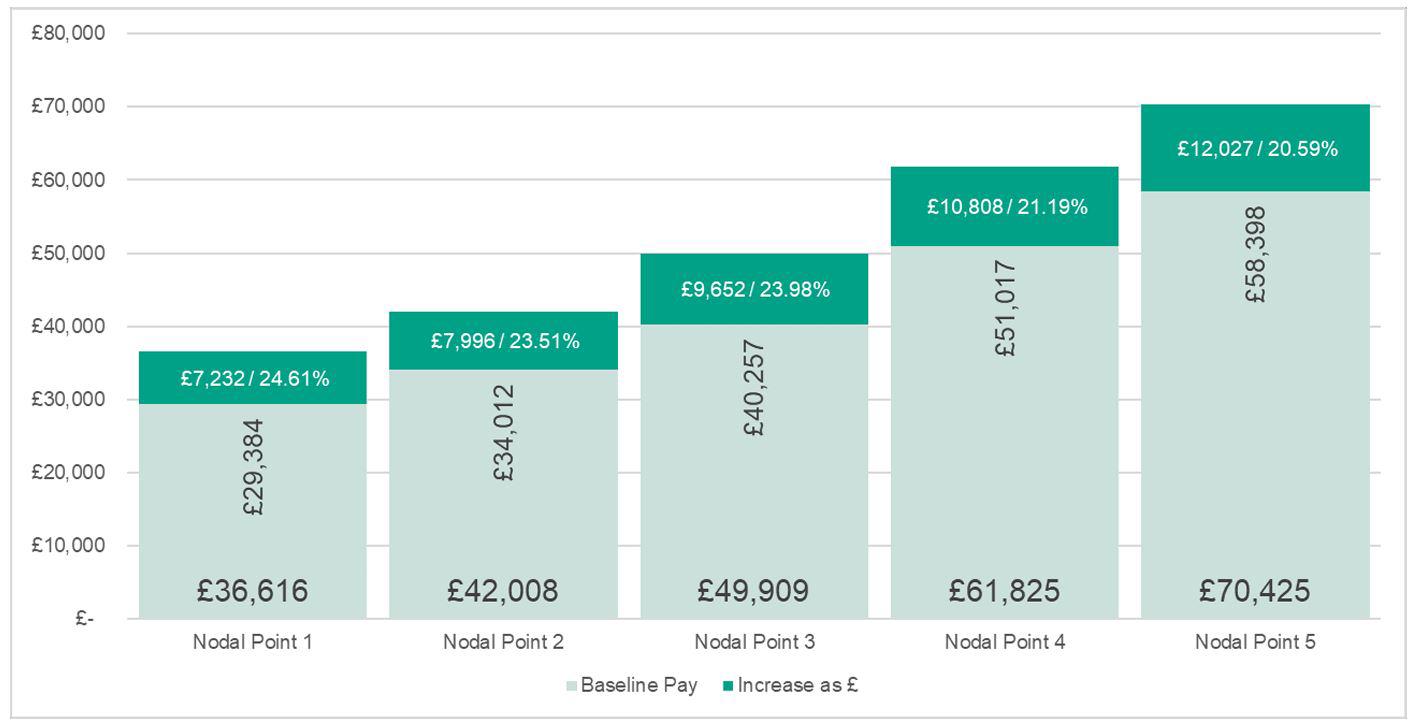Introduction
On Tuesday 23 July 2024, the BMA Resident Doctors Committee negotiating team entered negotiations with Secretary of State for Health and Social Care Wes Streeting and his team. After multiple iterations, we were presented with a final offer on Friday 26 July and the committee met to agree next steps on Saturday 27 July.
After eleven rounds of strike action, including our latest during the General Election, the BMA’s Resident Doctor Committee believed this offer was credible enough to be put to our members for a vote, and recommended a vote to accept. A referendum was held between 19 August and 15 September 2024 and the membership voted to accept the offer and turn it into a deal, ending our pay dispute.
This deal marked significant progress in our journey to reverse years of pay erosion, and we only reached this position because of your strike action and your refusal to accept below-inflation pay awards. Your action clearly influenced the DDRB; its 2024/25 pay recommendations, along with the offer from the Government, led to the highest pay award of any public sector worker over the last two years.
The deal was not the end of the journey, but a chance to bank a pay uplift for doctors that represented a step towards our unchanged goal of full pay restoration. We took the opportunity to reconsolidate our workplace power, strengthen our campaign strategy and replenish personal strike funds, ready for the second phase of our campaign for full pay restoration.
The full detail of the deal is below, as set out in the offer document circulated at the time of the referendum. Updates on the future of the pay campaign and the progress made on the non-pay elements of the deal can be found elsewhere on the BMA website.
Reforms to pay for resident doctors
Pay offer for 2023-24
The Government will invest an average of a further 4.05% into 2023-24 pay scales for resident doctors. This means that the 2023-24 pay scales are on average 13.2% higher than in 2022-23 – an improvement of 4.4 percentage points from the current 2023 – 24 pay scales.
The offer targets a greater proportion of the investment envelope at Nodal Point 3, whilst ensuring that acceptable differentials remain between the Nodal Points.
Uplifts will be applied to the pay scales for the 2016 and 2002 contracts as well as to local pay scales which mirror those contracts.
The effective date for these changes will be 1 April 2023 and resident doctors will receive a payment to reflect backpay.
Pay for 2024-25
In addition, the Government has accepted the recommendations of the Review Body on Doctors’ and Dentists’ Remuneration (DDRB) and uplift each Nodal Point by 6% plus £1000, on a consolidated basis, with an effective date of 1 April 2024.
The combined impact on the 2024-25 pay scales of the adjustments to the 2023-24 scale will be as follows:
Resident Doctor 2016 contract
| Nodal point | 2022-23 pay scale | % uplift on 2022-23 pay scale | £ uplift on 2022-23 pay scale | 2024-25 pay scale |
|---|---|---|---|---|
| 1 | £29,384 | 24.61% | £7,232 | £36,616 |
| 2 | £34,012 | 23.51% | £7,996 | £42,008 |
| 3 | £40,257 | 23.98% | £9,652 | £49,909 |
| 4 | £51,017 | 21.19% | £10,808 | £61,825 |
| 5 | £58,398 | 20.59% | £12,027 | £70,425 |
Note: The journey towards the 2024-25 pay scales are given in annex A.
2002 contract
-
Under the offer, all Resident Doctors on the 2002 contracts and Locally Employed Doctors mirroring those contracts would receive an initial uplift of 3.71% to the current 2023-24 pay scales, applied with the usual methodology used to calculate uplifts in the pay circulars.
-
Subsequently applying the 2024-25 DDRB recommendation of 6% + £1,000 means that the 2002 contracts receive an average uplift of ~9.9% + £1,000 compared to the current 2023-24 pay scales, again applied with the usual methodology used to calculate the uplifts in the pay circulars.
Pay for 2025-26
The government acknowledges concerns raised by the BMA and other parties that the medical profession is not as attractive a career prospect as it once was.
The Secretary of State for Health and Social Care would therefore like the DDRB to consider, as part of its pay recommendations, the overall reward package and career progression for resident doctors to ensure that medicine is an attractive and rewarding career choice to deliver our consultants and GPs of the future.
Flexible Pay Premia
The 2016 terms and conditions will be amended to set out that the DDRB, as part of their annual remit, should uplift Flexible Pay Premia in line with their pay recommendations for resident doctors.
Measures aimed at improving the experiences of resident doctors
Rotational placements
As part of the work to develop a ten-year Health Plan, DHSC will lead work in partnership with the BMA Resident Doctor Committee, NHS England, devolved administrations, the Medical Royal Colleges, the GMC and employers to reform the current system of training and rotational placements. This will be agreed by all parties.
Whilst maintaining the high standards of training required to practice as a doctor, the work will seek to review the training model with regard to the number and frequency of rotations and to review and, where needed, redesign curriculums.
The work will also seek to prioritise the experience of resident doctors, minimise the administrative and bureaucratic hurdles involved in rotating; address the relocation, logistics, travel and accommodation issues; seek to reduce and minimise disruption to personal and family life; and ensure more consistent support systems across different rotations and geographies.
This work will also include a separate NHSE review of training numbers, both to address the training bottlenecks which already exist and the planned expansion of medical school places, to ensure patients have access to the resident doctors they need today, and the consultants and GPs they will need in the future. NHSE’s work will have to have regard to the implications for the Devolved Administrations.
Exception reporting
After six months of hard-fought negotiations and a formal trade dispute, the BMA resident doctors committee (UKRDC) secured an agreement on exception reporting (ER) reform, as agreed in the 2024 pay deal.
Key wins include:
- Rolling fines for Employers who fail to onboard residents onto an ER system within 14 days of starting work
- Financial penalties for employers who breach new confidentiality processes for ER data
- All residents must receive their choice of either payment or time off in lieu (TOIL) for all time worked above contracted hours following ER, except when a breach of safe working hours mandates the award of TOIL. All resulting payments and TOIL must be facilitated by responsible parties and must not be substituted without residents’ consent. Additional hours reports go to HR and the GOSWH, rather than to supervisors
- Educational exception reports go to DMEs
- Doctors’ clinical judgement around working additional hours will not be challenged.
- Window to submit an exception report increased to 28 days
Read further details about exception reporting reforms
Expectations in return for reform
BMA rate card
If this deal is accepted by the membership, the BMA will withdraw the rate card for resident doctors in England with immediate effect.
End of the dispute
If the BMA Resident Doctors Committee in England accept this offer, it is made under the requirement that:
-
the BMA Resident Doctors Committee in England do not call any strike action for the duration of the referendum;
-
the BMA, the Resident Doctors Committee, and its officers will consistently and firmly recommend to their members that this offer should be accepted; and
-
the BMA agree that the acceptance of the offer by their members terminates the present trade disputes in relation to the resident doctor workforce in England.
Annex A: Journey towards 2024-25 pay scales for the 2016 contract
Step 1) Targeted uplift averaging 4.05% applied to current 2023-24 pay scale
Uplifts averaging 4.05% applied to 23 −24 pay scales (4.4% against 22 −23 pay scales)
Target NP3 with 1% more than the average uplift ( 5.05%), 3.71% uplift to remaining points including those on 2002 contracts and LEDs.
 The £ and % increases are compared to the current 2023 -24 pay scale
The £ and % increases are compared to the current 2023 -24 pay scale
Step 2) 2024-25 DDRB recommendation then applied to the revised 2023-24 pay scale
Uplifts averaging 4.05% applied to 23 −24 pay scales (4.4% against 22 −23 pay scales)
Target NP3 with 1% more than the average uplift ( 5.05%), 3.71% uplift to remaining points including those on 2002 contracts and LEDs. 24−25 DDRB recommendation then applied
 The £ and % increases are compared to the current 2023 -24 pay scale
The £ and % increases are compared to the current 2023 -24 pay scale
Cumulative impact of uplifts from 2022-23 pay scale to 2024-25
2022-23 pay scales with 2023-24 DDRB applied, then uplifts averaging 4.05% applied to 23-24 pay scales, with NP3 targeted with 1% more than the average uplift (5.05%) and 3.71% uplift to remaining points including those on 2002 contracts and LEDs, 24-25 DDRB recommendation then applied.
 Cumulative impact of uplifts from 2022-23 pay scale to 2024-25
Cumulative impact of uplifts from 2022-23 pay scale to 2024-25


